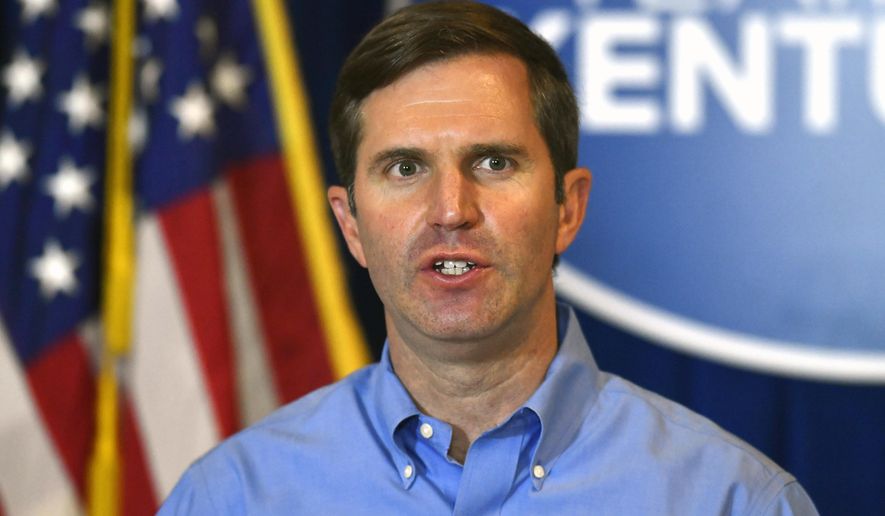FRANKFORT, Ky. (AP) - Kentucky Republicans passed a state budget Monday that mostly holds the line on spending but sets significant money aside in a “rainy day” fund as they consider how to use massive amounts of pandemic-related federal money headed to the state.
Democratic Gov. Andy Beshear, disappointed that the budget stripped his proposals for across-the-board pay raises for school employees and state workers and increased spending for public education, fired back immediately with a clear message: It’s already raining.
The one-year budget - a continuation of most of the spending now in place - first passed the Senate and hours later cleared the House Monday night. The measure now goes to Beshear, who doesn’t have enough Democratic votes in either chamber to sustain any line-item vetoes. The bill resulted from negotiations among top lawmakers in the GOP-dominated chambers.
The Democratic governor said the huge sums added to the state’s “rainy day” fund were intended to help the state confront an emergency.
“That is not the state’s money, it’s the people’s money,” Beshear said at a press conference. “And at a time of a pandemic, at a time of significant unemployment, is this not the rainy day that the rainy-day fund was meant for?”
Republican Senate President Robert Stivers said the budget stockpiles money in the reserve account while lawmakers await federal guidance with specifics on how they can they can spend the infusion of pandemic federal aid to state government- expected to total about $2.4 billion.
“It’s going to have a lot of reserve cash left in it, because we prefer … to use the federal dollars, once we find out what it can be used for, instead of our state dollars,” Stivers said.
That could free up state money to spend elsewhere, the Senate leader said. He noted that lawmakers were talking about putting hundreds of millions of state funds into broadband expansion, but then found out that part of the federal aid can be used for that purpose.
Lawmakers only found out about the scope of the federal aid as they were in budget negotiations. Stivers said multiple state budgets might pass this year as lawmakers discuss how to spend the money.
An undercurrent of the friction between Beshear and Republican leaders may be the question of who decides how the federal money is spent. Republican lawmakers added a provision to the budget bill giving them “express authority” over how the federal money is spent. But Beshear and Stivers struck similar tones in discussing overall strategy in investing the money, and discussions between the governor and lawmakers are ongoing.
“We need to think big and we need to think bold,” Stivers said in a Senate speech Monday.
Beshear has urged lawmakers to be bold in fashioning a budget that positions Kentucky to better compete in the post-coronavirus economy.
Stivers talked broadly about potential opportunities with the huge amount of money.
“What if we did create a research pool for our universities to access?” he asked, noting the lucrative jobs and long-term federal research money that could flow into Kentucky.
Sen. Morgan McGarvey, the chamber’s top-ranking Democrat, called it a “once-in-a-generation opportunity” for the state.
“It is time for us to rise and meet the challenge that has been set before us, and to use this money to meet the needs of Kentuckians and invest in our future and to do it this year,” he said. “This cannot be the final budget that comes out of this legislature.”
As the budget work continues, McGarvey said, lawmakers should circle back to “fill those holes” left in the continuation budget by spending more on education and health care.
Beshear said he hopes an agreement can be reached on how to spend significant amounts of the federal money before the legislative session ends in late March. Lawmakers are scheduled to meet Tuesday and two days at the end of this month before their 30-day session ends.
In January, Beshear proposed a separate virus relief bill that included $220 million in aid for small businesses. That proposal was missing from the budget bill that passed the legislature, he said.
Investments in school construction, broadband expansion and water and sewer projects would create tens of thousands of jobs in the next year or so, he said Monday.
“That is exactly what the doctor ordered in making sure that our recession is short, that our people get to work and that we jump-start our economy,” the governor said.
___
The budget bill is House Bill 192.




Please read our comment policy before commenting.